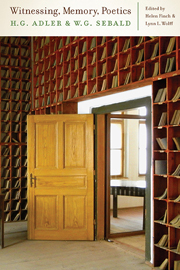Book contents
- Frontmatter
- Contents
- Acknowledgments
- List of Abbreviations
- Introduction: The Adler-Sebald Intertextual Relationship as Paradigm for Intergenerational Literary Testimony
- Part I Intertexts in Context
- Part II Witnessing Trauma and the Poetics of Witnessing
- Part III Memory, Memorialization and the Re-Presentation of History
- 7 Memory, Witness, and the (Holocaust) Museum in H. G. Adler and W. G. Sebald
- 8 History, Emotions, Literature: The Representation of Theresienstadt in H. G. Adler's Theresienstadt 1941–1945: Das Antlitz einer Zwangsgemeinschaft and W. G. Sebald's Austerlitz
- Part IV Literary Legacies and Networks
- Afterword
- Bibliography
- Notes on the Contributors
- Index
7 - Memory, Witness, and the (Holocaust) Museum in H. G. Adler and W. G. Sebald
from Part III - Memory, Memorialization and the Re-Presentation of History
Published online by Cambridge University Press: 05 October 2014
- Frontmatter
- Contents
- Acknowledgments
- List of Abbreviations
- Introduction: The Adler-Sebald Intertextual Relationship as Paradigm for Intergenerational Literary Testimony
- Part I Intertexts in Context
- Part II Witnessing Trauma and the Poetics of Witnessing
- Part III Memory, Memorialization and the Re-Presentation of History
- 7 Memory, Witness, and the (Holocaust) Museum in H. G. Adler and W. G. Sebald
- 8 History, Emotions, Literature: The Representation of Theresienstadt in H. G. Adler's Theresienstadt 1941–1945: Das Antlitz einer Zwangsgemeinschaft and W. G. Sebald's Austerlitz
- Part IV Literary Legacies and Networks
- Afterword
- Bibliography
- Notes on the Contributors
- Index
Summary
Introduction
In W. G. Sebald's final prose workAusterlitz (2001), the eponymous protagonist famously consults H. G. Adler's encyclopedic study of Theresienstadt and expresses regret at never having met its author. While this is surely the most tangible link between the two men, another place, also instrumentalized in the mechanisms of Nazi persecution and deportation, suggests a further connection: the Jewish Museum in Prague. Adler was personally involved in the work of the museum immediately after World War II and it leaves an interesting mark on his fiction, providing the model for the two museums that feature in the novels Eine Reise (The Journey, 1962, but written 1950) and Die unsichtbare Wand (The Invisible Wall, 1989, but written 1954–56). In particular, Adler thematizes the role of the Jewish Museum under Nazi occupation, when it became a site of deposit for the possessions seized from deportees. Although Sebald makes no mention of the Prague museum in his work, this perverse twist in its history makes it a positively Sebaldian institution and suggests links to the other museum spaces that feature so frequently in his prose. Indeed, Sebald's narrators are, according to J. J. Long, “obsessed … with the places where the past has deposited traces and fragments that have been preserved and in many cases systematized, catalogued, or indexed.
- Type
- Chapter
- Information
- Witnessing, Memory, PoeticsH. G. Adler and W. G. Sebald, pp. 159 - 179Publisher: Boydell & BrewerPrint publication year: 2014



